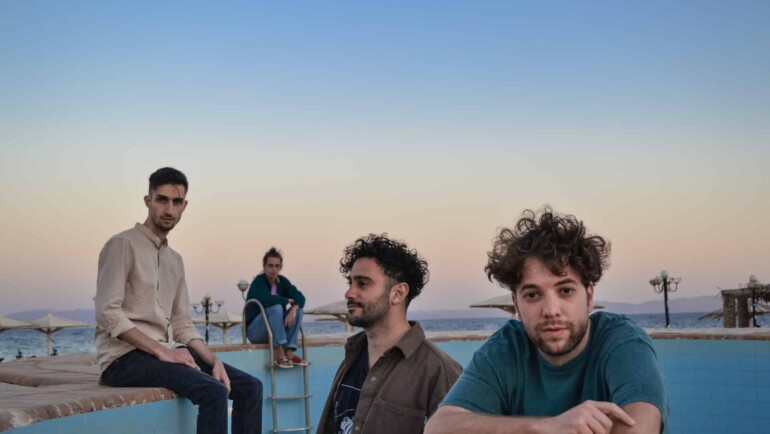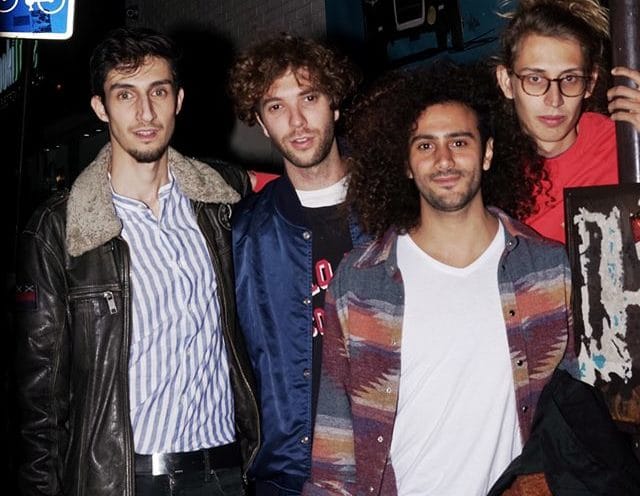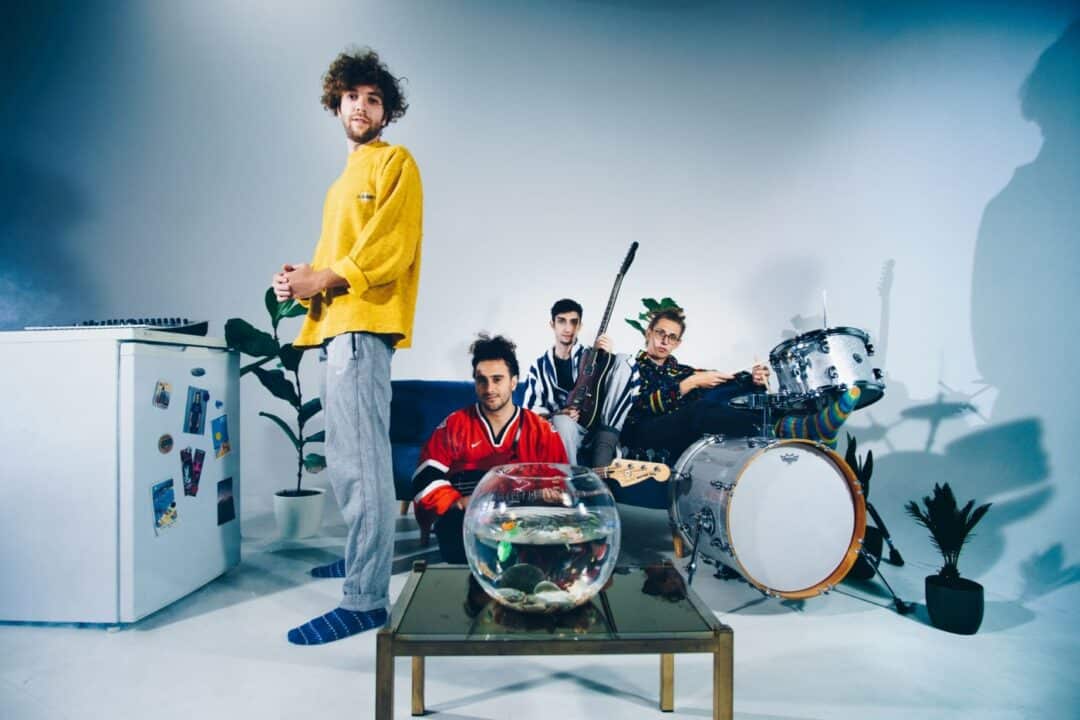
It’s Saturday. A damp heat lies on the Alte Donau and it is oddly still, though the heavens are heavy with the prospect of a spring thunderstorm. Alex Kriz, Markus Schwarz, Omar Abdalla, and Areg Barseghian – collectively known as Siamese Elephants – sit on a dock and tell a story that goes well with the weather: their new album, There Goes the Sun, deals with the ambivalence of life in the era of climate crisis, alienation, and world-weariness. But the boys from Floridsdorf haven’t lost their optimism; the record’s sound is balanced elegantly between disco flair and melancholy. The Vienna indie-rock band talks to Ania Gleich about the importance of self-love and why it should always be a little dirty.
Your album leaps from euphoria to melancholy and back – which feeling is more important?
Markus Schwarz: Definitely both! We take a while to write songs, and in that time period you go through all kinds of phases; that’s just life.
Alex Kriz: It’s also been two years between the first album and this one.
Markus Schwarz: After we finished What Happened at the Social Club? we were euphoric that we could finally start something new. On the other hand, we were going from one lockdown to the next, a war started, and the climate crisis was getting worse and worse…the melancholy was definitely there. But this feeling of being free to do something new – most of all with the sound! – was still very powerful for me.
“Pushing on in spite of everything.”
Alex Kriz: That was also the first issue with There Goes the Sun, being able to come to terms with a lot of things. Concerts were cancelled, some things just weren’t possible. You just had to accept it.
Omar Abdalla: Two years ago the band situation also wasn’t totally clear internally, because I had a visa problem.
Alex Kriz: Omar’s lived here for twelve years, but it wasn’t easy for him to get a visa. At the time we were very into the idea of a global passport.
Omar Abdalla: It was a complicated time for me personally, but for us it was always about pushing on in spite of everything. That ‘in spite of’ is important. In the end, I got my citizenship, but I didn’t quit in the middle. Then, finally, there was time for euphoria! The feeling that we went for on “Sunday” comes out of uncertain times. But that’s life. We wanted to really focus on that ‘in spite of’ – regardless of all the crises, we can live our lives the way we want to.
Alex Kriz: Of course, globally speaking, you can also view that attitude negatively.
Areg Barseghian: As an individual, it’s easy to get lost among the big problems. When you take in all the crises around us without any filter, it can be overwhelming. But our album captures really well how you can truly cherish the little moments. Like, just being at a concert, letting go, enjoying the moment. If the world is going to end, we have to cherish the little moments.
Alex Kriz: We had that in the back of our heads a lot of the time: what should we do if the world is going to be struck by an asteroid tomorrow and we only have a few hours left to live?
Don’t look up!
Alex Kriz: Exactly! That movie was also a kind of inspiration, in the end.
“The Weltschmerz is paralyzing.”
Can we even allow ourselves to escape into that kind of feel-good mood in the midst of climate crisis and war?
Alex Kriz: It’s totally ambivalent. You want to be aware of things, but there’s so much negativity there that’s it’s often hard. The Weltschmerz is paralyzing. Music has always been an escape for me, a way out of that negativity. That’s the thing for me that has influenced making music, listening to music, and the spirit of the band as well. We’ve all got our everyday problems – but when we rehearse together, we can forget them.
Areg Barseghian: But we’re also learning to actively confront the conflicts and the emotions.
Markus Schwarz: Basically, making music together is like a conversation, but without having to look for the right words. Even when you’re expressing bad feelings, it’s a good feeling to play together. That’s hard to achieve in another setting.
Alex Kriz: It’s like therapy!
Omar Abdalla: It’s not just escapism – as a person, you also have to recognize the emotions you have. I think being aware of your own needs gives you energy you can devote to larger causes. Otherwise, the human psyche can’t handle it.

Haven’t the last few years taught us how to deal with ambivalence?
Omar Abdalla: Oh, yes. The people who haven’t learned it tip over into extremism.
Areg Barseghian: But the issues today are too complex to allow for black-and-white solutions.
On the other hand, it also leads to young people in particular not wanting to decide – ‘Generation Maybe’.
Areg Barseghian: I’ve seen a whole lot of that among people I’m close to. It ends up partly going to the other extreme: too much ‘maybe’, too little ‘just do it’. You can’t stay on the fence forever; you have to decide. Because even if it’s not the best decision, you learn from it, and your next decision will be better. But to do that, you have to be true to yourself, and that’s not easy for a lot of people.
On “Back On The Run”, you sing about ‘TikTok toxic sympathy’ – do young people have this decision fatigue partially because they’re constantly being bombarded from all directions?
Omar Abdalla: In every sense! But I have to emphasize that that phenomenon only exists here in Europe – in the West. When I think about the effect it’s had on my dating behavior alone…you swipe right and immediately think, “yeah, but maybe someone cooler will come along.”
“Spoiled for choice.”
Is there a lack of commitment?
Omar Abdalla: Yes, but there’s the same in careers and jobs. You could do whatever you want.
Alex Kriz: Spoiled for choice!
Markus Schwarz: “Back On The Run” is about exactly that feeling. As if you were running away from making the right decision anyway. Or confronted with so many options that you don’t know what to do anymore. We kind of exaggerated it a little.
What’s your ‘toxic sympathy’ for TikTok?
Alex Kriz: I think I actually wrote this phrase about Jeremy Fragrance – he got famous on TikTok. He doesn’t seem like a person I’d like very much, but at the same time there’s something compelling about him. It’s weird how you can feel that much affinity for someone you actually find totally unlikeable. You’re amazing when you find yourself stopping to watch another one of his videos.
Omar Abdalla: Or when you’re actually morally opposed to specific content, but you still ‘have’ to watch it…
It only lasts a few seconds.
Omar Abdalla: For instance, a lot of people follow Trump, although it’s just nonsense.
Areg Barseghian: I think we’re going to go down a rabbit hole very quickly if we keep talking about it. You have to push away the things that are way too much and try to concentrate on the little things.
Markus Schwarz: The thing about TikTok and music is, now you need a hook that’s maximum fifteen seconds long for the algorithm. That does something to the sound; you start thinking things like, are we getting to the chorus fast enough? We have to keep reminding ourselves that we don’t want to write songs according to criteria like that.
“As soon as self-love harms someone, it’s not self-love anymore.”
Your song “A Bit In Love” is about loving oneself. Can self-love help you deal better with this TikTok fragmentation?
Markus Schwarz: You have to be able to get along with yourself; we learned that during the pandemic. Alex wrote the lyrics to that song almost by himself.
Alex Kriz: That was exactly the approach, that ‘just being OK’ with how you are. I noticed it with myself, too – I distract myself with socializing and lots of appointments. The lockdowns forced us to confront being alone. It sounds like a love song, but it’s actually a self-love song. You have to love yourself before you can love others!
That’s as old as the Bible.
Omar Abdalla: Of course, too much self-love is a bad thing too. I see this constant advertising of ‘self-love’ on Instagram as just as much of a problem.
Areg Barseghian: When we say self-love, we mean respecting ourselves at least enough to not harm ourselves.
Omar Abdalla: I’d also interpret it as contentment.
Markus Schwarz: That other stuff is products that are marketed under the name “self-love”.
Capitalism swallows everything.
Areg Barseghian: As soon as your self-love harms someone else, it’s not self-love anymore.
That sound with synths and auto-tune makes me nostalgic for a time that I never experienced. Can you explain that?
Alex Kriz: It’s funny you should say that! A couple years ago, most of us were binging “Stranger Things”. The theme music alone – that stuck with us. We started putting more and more synth sounds into the songs. I don’t know how conscious it was, but that 80s vibe comes from a time before us.
Omar Abdalla: On “Avenues”, it sounds more like the 90s to me.
Markus Schwarz: You see – we’re not even sure ourselves.
Omar Abdalla: I think each of us could give you a completely different perspective on our sound.
Markus Schwarz: We just jammed. When you play together, something always comes out – and of course, we all listen to older music.
How do you create a song?
Omar Abdalla: We agreed that every line we write – whether it’s vocals, guitar, or synth – has to pass through four filters. That means that everything takes a little longer, of course. But it never happens that one of us comes to the rehearsal with a finished song.
Markus Schwarz: Since we listen to really different music to an extent, we’re only satisfied if we all think it’s cool. That’s our quality assurance. You can’t just cook according to the recipe.
Omar Abdalla: “Avenues” is a testimonial for our making synth sounds a central element in our sound. In contrast to the EP or the first album, Markus and I brought in a little bit of a soul/hip-hop feeling, and a disco element.
“You can’t do it without a little dirt!”
Markus Schwarz: And then you add a little bit of dirty guitar.
Areg Barseghian: You can’t do it without at least a little dirt!
Omar Abdalla: You have to give Areg credit: he really likes to play dirty, but he often holds himself back really creatively, so that it’s in the service of the song.
Areg Barseghian: I’ve really grown with the whole thing, especially since Omar’s been in the band. We push each other in directions we would never go on our own. When I was a teenager, I was listening to System of a Down and Billy Talent – Ian D’Sa was my absolute hero. When I lay down a gentle riff with a chorus effect for a Siamese Elephants song, it’s not the same thing.
Markus Schwarz: But if you know, you can hear it in your playing!
Areg Barseghian: What I found fascinating about Ian from Billy Talent was, he was the only guitarist in the band, and he constantly had to combine the lead lines with the rhythm lines. It was really top-notch. That’s why he was my role model.
Alex Kriz: He is a little underrated.
Do you have a musical Holy Grail that you all pursue?
Omar Abdalla: A term that came up when we were talking about it recently was ‘contemporary indie music’. That has that old aspect of ‘indie’ but channels it freely into the future.

Alex Kriz: We used to play indie rock, but since I bought the synths, we’ve been making indie pop! The Parcels were one inspiration for us – they’re just so perfect.
Areg Barseghian: Their tightness, at least.
Markus Schwarz: They were a Holy Grail in terms of an attitude. Instrumentally totally cool, but not showing off.
Omar Abdalla: It’s nice, it’s humble, it’s simply wholesome.
Those sound like closing words to me!
Ania Gleich, translated from the German original by Philip Yaeger.
